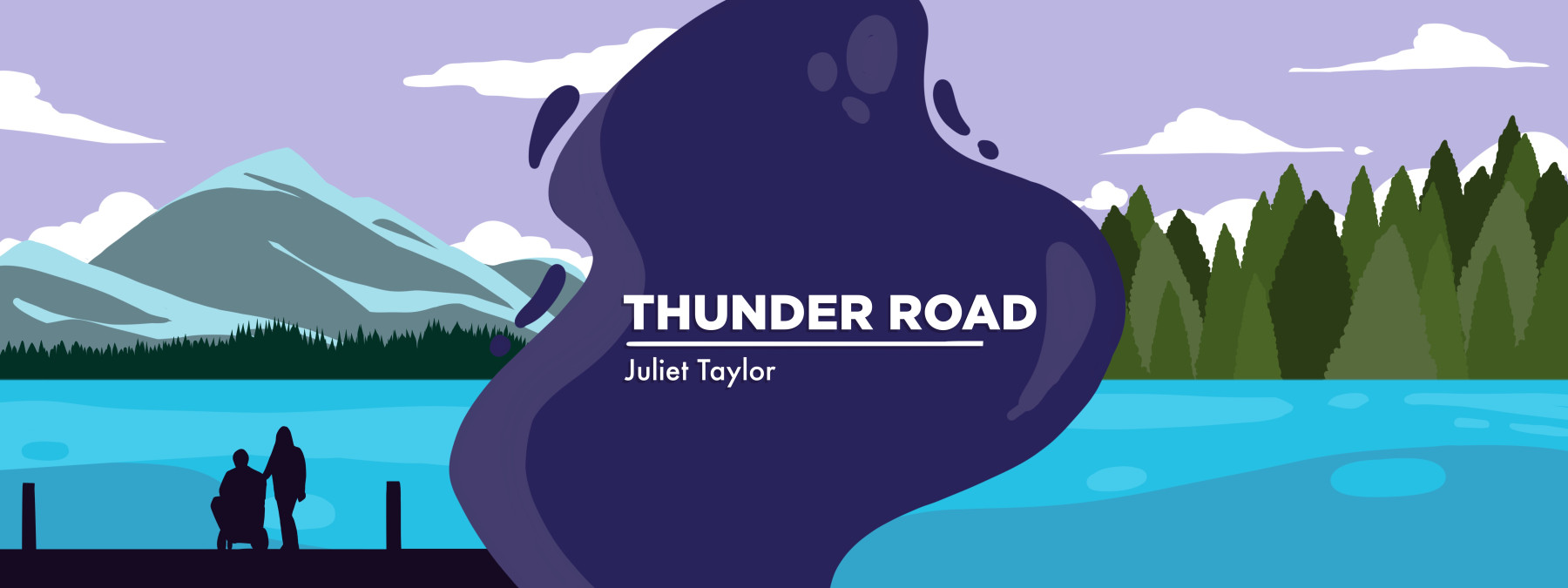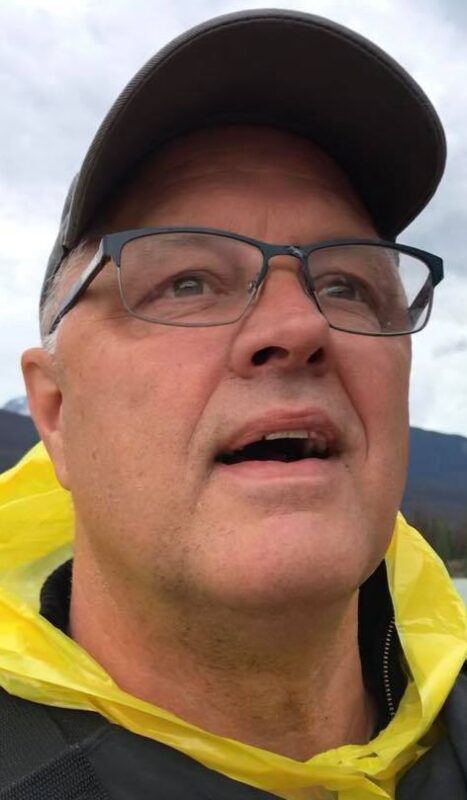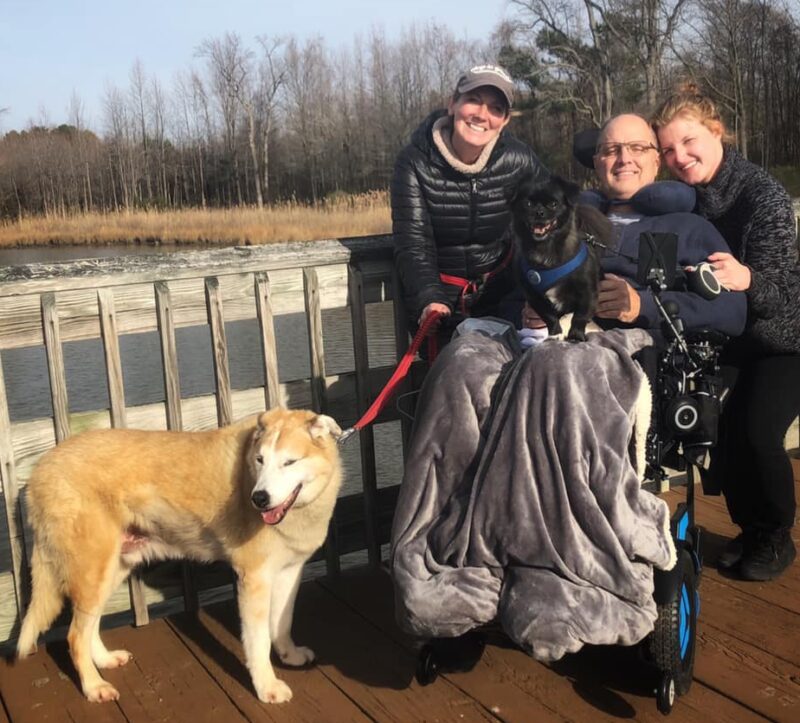Why I share with others the details of my late husband’s life with ALS
An ALS Awareness Month reflection on love, loss, and hope for a better future
Written by |

Like many others, I completed the Ice Bucket Challenge when it became a cultural phenomenon in 2014.
Created by Anthony Senerchia, Pat Quinn, and Pete Frates, who were living with ALS and have since died from the disease, the challenge involved being doused with a bucket of ice water, uploading the video to the internet, and challenging others to do the same, all in the name of raising awareness and funds for ALS research. That summer, the Ice Bucket Challenge went viral, with more than 17 million people sharing videos online. The challenge has raised more than $115 million since it began 10 years ago.

Jeff Sarnacki looks on in wonder while floating on the Athabasca River in Canada, in June 2019. (Photo by Juliet Taylor)
I didn’t fully understand ALS when I took the Ice Bucket Challenge. The challenge sounded fun, and I appreciated that it was for a good cause. In fact, I didn’t understand the gravity of ALS at all until my late husband, Jeff, was diagnosed with it in 2018.
As a young girl, I’d seen my friend Erin’s dad and her family live with the disease, and I’d felt sorrow and empathy for my sweet friend. Still, I hadn’t witnessed firsthand the devastation that ALS causes until Jeff was living with it.
I bring this up in today’s column because May is ALS Awareness Month. Each May, ALS organizations run education and awareness campaigns to shed light on what ALS is, why it’s so horrible (it’s currently 100% fatal, but not before wreaking destruction on families before it goes), and most importantly, why it’s so critical to raise money to research treatments and eventual cures.
When Jeff was diagnosed with ALS, we collaborated on many things: his care, his treatments, and preserving, as best we could, his quality of life and dignity. One area where we differed was participating in the ALS community. Jeff, for reasons I understand and respect, did not want to become further involved with ALS. Behind the scenes, he wrote letters advocating for the creation of Lou Gehrig Day in Major League Baseball, but he focused his time living with ALS on other pursuits that brought him joy and satisfaction.
As Jeff’s caregiver, though, I needed to learn. I needed to understand how to help him lead a life that was safe, enriching, and meaningful. For me, the best way to learn these things was through the ALS community. So, a few months after his diagnosis, I began volunteering with a recently created organization called I AM ALS. Founded by Brian Wallach and Sandra Abrevaya, I AM ALS helped me connect with other families living with ALS, and they became quite literally a lifeline on some of our darkest and scariest days.
Through my new friends in this community, I learned the true extent of ALS devastation: the relative lack of treatments, the absence of cures, the unbelievable financial toll the disease can take on individuals and families. I learned the ways that working together as a community can drive change through both small and large acts of education, advocacy, and awareness-building. I learned that there are many people working tirelessly and humbly to end this disease, and that they give freely of their personal time and resources to do so.
The meaning of unwavering determination

From left, Juliet Taylor, Jeff Sarnacki, and Makelle Sarnacki walk their dogs Rudder and Guy on Christmas Day in 2019. (Courtesy of Juliet Taylor)
Five days after his 60th birthday, on May 20, 2020, Jeff died here at home. His passing was peaceful and he was surrounded by family and love. In a few weeks, he will have been physically gone for four years, though I feel his presence and influence every day. He left me with the peaceful life we built together, beautiful memories, and a goofy, happy Labrador to keep me company. He also left me with determination.
I needed a few months after Jeff died to ignore everything ALS. I was sad and angry, and felt ripped off. I didn’t understand why ALS had chosen him, and why, once it did, he didn’t have more time. I hate that he didn’t get to become a grandpa when his granddaughter was born five months after he died. I had, and still have, survivor’s guilt.
It’s for all those reasons that my break from the ALS community was short-lived. Staying involved, volunteering, and taking action alongside other families helps me believe that one day soon, some future grandchild will enjoy a day at the park with their doting grandfather, some wife will enjoy a full life with her husband, some young person will live to be 90 rather than 35.
May is ALS Awareness Month, but for so many of us, ALS awareness is every day. The more we can share about ALS — in big ways or small — with others both in and outside of the community, the closer we get to treatments, cures, and one day, a world without ALS at all.

A Superman coloring sent to Jeff by his great-niece Emma. (Courtesy of Juliet Taylor)
Note: ALS News Today is strictly a news and information website about the disease. It does not provide medical advice, diagnosis, or treatment. This content is not intended to be a substitute for professional medical advice, diagnosis, or treatment. Always seek the advice of your physician or other qualified health provider with any questions you may have regarding a medical condition. Never disregard professional medical advice or delay in seeking it because of something you have read on this website. The opinions expressed in this column are not those of ALS News Today or its parent company, Bionews, and are intended to spark discussion about issues pertaining to ALS.







Bob Miller
I was diagnosed in June 2022 and my doctor told me there would be a 70% chance that I would be dead within two years. It’s almost 2 years and I’m alive. Well sort of alive. I’m not afraid of dying. I’m scared of what the last 30% looks like anyway I’ll try to live life as happy as I can
Brenda Butler
I lost my daughter February 5, 2024. She was 53. I HOPE one day they will find a cure.
Lisa Williams
Thank you for your letter. Our story is quite similar with our husbands. Mine got to the 3 1/2 year mark and was 61, missed grandson, Shelby’s birth, but was aware he would be born and I, too, wanted to be involved. The first two years I was all in (Steve Gleason Foundation, ALS of Indiana and mentored for IAmALS until one day I couldn’t. I needed the break from it for awhile and then last month my neighbor was diagnosed. Ironically, he has two sons the exact same ages as mine and I feel like Deja vous. So many emotions and sadness for what their journey with be. I really appreciated hearing you say many of my thoughts.
Chuck Zimmerman
Our 54 year old daughter, Heidi, with four children ages 14 to 22, was diagnosed February, 2023. We are in Massachusetts. I wish we were closer. Your article was helpful.
Annette Lyons
We lost our beautiful daughter Emma she was diagnosed with ALS at age 34 and passed at 38 we still are heartbroken.
John Trevor Bower
All of us with ALS wish there was some breakthrough technology or drug that would reverse our decline everyday. Frustrating. Thankfully I have a group of nurses visiting my home everyday that give me positive vibes when I'm psychologically down after another setback. There are so many things I want to do and time to accomplish them is running out. Thanks you for your ALS emails!
Lucille Dolly Syrek
My husband Matt was diagnosed with ALS six months ago. Symptoms were trouble walking without a cane slow short steps. He got the flu then lost all control of his legs. Like overnight our lives have changed. Released home from the hospital we needed 24hr care givers. Hospital bed, Hoyer lift, electric wheelchair. His symptoms came on so fast after he was diagnosed. We don't know if his symptoms will continue to accelerate or not as everyone's case is different. There are no local support groups that I could find. I would love to learn the progression rate at different stages.
Maureen J
Re: Lucille. There’s an article with some information, but due to the uncertainty of ALS, it doesn’t really give a progression rate of the different stages. More on what the 7 stages are in the typical ALS vague explanation.
https://www.dvcstem.com/post/7-stages-of-als
I lost my husband in 2022 after his four 1/2 year battle with this cruel disease. He was 40 years old, leaving me and our two young daughters (4 &7) behind. He was a participant in the Brainstorm Stem Cell trial, which is a whole other piece of emotion. I was his main care giver with some nursing help for a few hours a day while I tried to work and be a mom. I am not sure I’ll ever shake the anger I have towards this disease. I am still on the ALS news emails and mostly pass it by, but read this article and thought I’d comment.
And thank you, Juliet, for this article. Hits home. I admire your determination to continue the fight to end ALS. The ALS community is lucky to have you.
Debbie Harris
Thank you for sharing! My wondering son-in-love Simon age 50 has it and was diagnosed July 2023. The heartbreak of watching him decline so fast is almost unbearable. He can no longer talk or walk. He just got a feeding tube. He has a lot of pain from the twitching in his chest and legs. The disease is very cruel! Our daughter says it's an honor to take care of her husband 24/7.
Simon would not join any ALS groups either and our daughter is so busy caring for him she doesn't have time to research or read anything about it. That's why I'm on here to help them. They also have four kids with the youngest age eight. Three are girls and Simon cries a lot knowing he'll never get to walk his daughters down the isle or see them graduate high school.
I pray for more research and a cure! The disease is horribly expensive to have. They tried stem cells twice and other treatments to no avail. The Progression rate differs for each person, along with when symptoms happen.
Cathie Lienemann
Juliet, I appreciated your well written letter expressing many feeling that our families share. My husband, Rich, has been battling ALS for over five years. Everyday is very challenging. He has set goals for himself, such as attending our youngest daughters wedding, then being there to meet his new grandson 10 months later. Just recently he celebrated our grandsons first birthday. Although Rich has very limited mobility and communication skills, his relationship with his grandson is the best therapy. We live each day waiting and praying for the ALS breakthrough to end this disease.
Jim Jedeikin
My brother in law, Sam, posted this article on facebook last month, but I didn’t read it until today, June 19. Yesterday Sam passed away 11 months after his ALS diagnosis. My mother died of ALS in 2006, not blood related to Sam, so this horrible disease somehow struck twice in our family even though it supposedly only happens to 1 in 25,000.